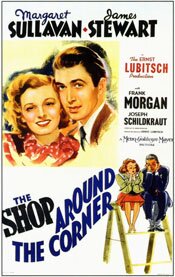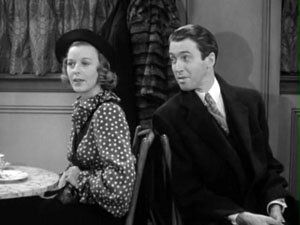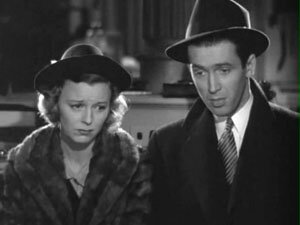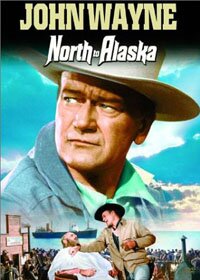It doesn’t seem right to call this a romantic comedy but that is how most would refer to it. Probably the most frustrating thing about it is that it could have been a good romantic comedy. It had the ingredients. It had the actors. So what went wrong? Continue reading
Less fun than sobering: Spielberg’s Catch Me
I watched Steven Spielberg’s Catch Me If You Can yet again (third time) over the weekend and now I’m back to my original opinion (as opposed to the one expressed below). Despite being promoted as ‘fun,’ and despite the sixties style ‘fun’ animation of the title sequence, this is really a rather somber story of a young man desperate to save his father from a marriage and life that are disintegrating.
Barbara Stanwyck must have liked working
Without intending to, I’ve found myself watching a lot of Barbara Stanwyck movies lately, including Double Indemnity (of which I’d like to scribble something one of these days). I believe IMDb shows she appeared in 101 movies and TV shows in her career. She really must have liked working.
I realized I have 18 Stanwyck movies on DVD (only a small number relative to her output). Of those, I’ve watched 15. There are three I’ve yet to see (but plan to): To Please a Lady, Jeopardy and Stella Dallas. Of the 15 watched, I’ve only written about a few, such as this one below. I watched it just last week.
My Reputation (1946)
Directed by Curtis Bernhardt
It seems a strange thing to say but My Reputation suffers from an actor’s performance that is too good.
Barbara Stanwyck portrays Jessica Drummond so well, you almost fume with frustration with her in the movie’s first half.
That’s not actually the case, however.
The problem is the movie and using its first third to create a portrait of a conflicted woman – it’s really a lot of exposition. As the Variety review from 1945 points out, the movie’s other star, George Brent, doesn’t make an appearance for about a half hour or so.
My Reputation is a romantic melodrama and, once the first third is over and certain things are established, entertaining in an average kind of way. Actually, thanks to Stanwyck’s performance, it’s above average. While a romance, it is also about psychological conflict and it’s that element where Stanwyck really excels.
Jessica Drummond is a recent widow who suffers from a domineering mother and friends who are superficial at best. She wants to assert herself as an individual, having been lost for years as secondary to others, but she can’t bring herself to do so. She makes a number of false starts.
This is what I mean about frustration: Stanwyck portrays the conflict so well that, if you are me, while sympathetic you want to tear your hair out because she is so mousy. However, once a new love shows up in the form of George Brent as Major Scott Landis the movie picks up as Stanwyck’s character becomes increasingly stronger.
It’s true the movie is dated, as some have pointed out, but I didn’t find that a particularly difficult barrier to get past, no more so than a historical film or book would be. It’s not a movie for everyone – despite the psychological aspect, it’s essentially a love story, a romantic fantasy.
If you don’t like romances, you probably won’t like this movie. On the other hand, if you want to see yet another brilliant Barbara Stanwyck performance, you really shouldn’t miss this one.
Blogathon Update:
- Self-Styled Siren has an update on the For the Love of Film (Noir) blogathon, including a specifically for the blogathon. Get ready! It begins Valentine’s Day (February 14) and runs through till February 21. Oddles of bloggers talking about film noir and film preservation.
Sullavan, Stewart and Box 237
I actually wrote the ‘review’ below about ten years ago. But I watched The Shop Around the Corner a few days ago and wanted to make a few changes, though I also forced myself to leave in some of the howlers, like the “wow” business.
It still doesn’t say what I’d like to say about Lubitsch (not that it’s anything life changing). But my last post and this one are part of me getting to what it is I’d like to write. Have I mentioned how much I love his movies?
 The Shop Around the Corner (1940)
The Shop Around the Corner (1940)
Directed by Ernst Lubitsch
Wow. What a great movie! I suppose that’s why so many remakes have followed it, including You’ve Got Mail. But while the attempts may have been well-meaning, there’s nothing like the original, The Shop Around the Corner.
One of the interesting things I find about this film is the fact that the setting, even the story, are so unlikely, so lacking in credibility, yet the film is unquestioningly true. How does that happen? The movie could care less about whether or not it is realistic. It’s pure romantic fantasy. (Think about it: Jimmy Stewart as a sales clerk in a gift-shop in Budapest?)
Yet reality informs the story and its characters. But it’s not the objective reality of science and journalism; it’s the reality of behavior and relationships. It’s the reality of people.
 The conceit of the film is pretty simple, which may be why it is such a template for other movies: Alfred (Jimmy Stewart) and Klara (Margaret Sullavan) have begun corresponding by letter as the result of Alfred stumbling across a classified ad Klara has put in the paper for a pen-pal. Both become enamoured of the person they think they are corresponding with.
The conceit of the film is pretty simple, which may be why it is such a template for other movies: Alfred (Jimmy Stewart) and Klara (Margaret Sullavan) have begun corresponding by letter as the result of Alfred stumbling across a classified ad Klara has put in the paper for a pen-pal. Both become enamoured of the person they think they are corresponding with.
A romance develops between them though they have never met. Within the fantasy that is the movie, we have two characters living fantasy lives.
In the meantime, Klara has become a clerk in the same shop where Alfred is the longest serving employee. The two find they can’t stand one another; they continually bicker.
There are various complications along the way, but you can guess where the film is going. Eventually the truth must come out, and it does.
The film works well for a number of reasons. One of these is the directing of Ernst Lubitsch. Everything flows, and there is total acceptance of the fantasy world. The performances he gets from his cast are also flawless. They’re wonderfully nuanced performances.
Jimmy Stewart portrays Alfred so naturally it’s hard to imagine it’s acting. (It’s very similar to the easiness of the performance he gives in a film like Harvey.)
 Margaret Sullavan is a terrific companion for him and the supporting cast, especially Frank Morgan (the Oz from The Wizard of Oz), are also brilliant.
Margaret Sullavan is a terrific companion for him and the supporting cast, especially Frank Morgan (the Oz from The Wizard of Oz), are also brilliant.
The Shop Around the Corner is an almost perfect romantic comedy. It does everything a romantic comedy should do. It feels real while being so obviously fantastic. It’s one of the most delightful and charming films ever made.
I also highly recommend reading Self-Styled Siren’s piece on Jimmy Stewart and The Shop Around the Corner. It’s called .
On Amazon:
John Wayne heads north – booze and brawls ensue
 Directed by Henry Hathaway
Directed by Henry Hathaway
This movie, North to Alaska, is a difficult one to account for. I really like it a lot. But I can’t think of a single cinematic merit it has going for it. Essentially, if you don’t like John Wayne’s later movies, especially the comic ones, you won’t likely take to this film. In fact, you may take a strong dislike to it because it’s corny and wildly sentimental. But if you do like John Wayne …
From something I read somewhere on the Web (does it get more definitive or authoritative?), North to Alaska was one of the first, if not the first movie of John Wayne’s later career, the older Duke, as far as his comic films go. Later, there would be films like, Hatari!, Donovan’s Reef (his last with John Ford) and McLintock!.
In this movie, Wayne is teamed with Stuart Granger. They’re Sam (Wayne) and George (Granger), two guys who strike gold in Alaska. Both are elated, George so much so he sends Sam to Seattle to bring back his fiancé, Jennie. Unfortunately, in Seattle Sam discovers she’s already married. She wasn’t nearly as serious about the engagement as George was. Sam, determined not to see his friend disappointed, brings back a saloon dancer instead, Capucine (Michelle Bonet).
There are, of course, complications. For instance, Sam and Capucine fall in love, complicating Sam’s determination to take care of his friend. And there’s Frankie Canon (Ernie Kovacs), a scoundrel looking for ways of cheating Sam and George out of their claim.
In the middle of all this there is a good deal of brawling between the boys of the Alaskan town (including Sam and George), as well as romantic gamesmanship between Sam and Capucine.
In the end, it’s romantic fantasy – an Alaska that didn’t exist (except in the most broadly interpreted sense) and a feisty and unlikely romance. But realism wasn’t what they were going for. It’s intended as escapist entertainment. So you never see the reality of brawling like that or of drinking that way.
On that basis, it’s a fairly engaging film and pretty well succeeds at what it aims to do. It may come across as somewhat anachronistic to anyone who didn’t grow up with John Wayne movies. The sensibility is definitely not contemporary.
If this was the first of the later John Wayne comic films, it’s easy to see the template established: a bit of “battle of the sexes” romance, a lot of phony-baloney brawling and a good deal of drinking that appears to have only brief ill-effects, and only if the plot calls for it.
It’s fantasy but it’s fun. Movies like this are really about giving the audience the John Wayne they expect, in situations that underline the image, and doing it in a light-hearted way. In a way, it’s a bit like teasing a beloved friend or relative.
Yes, I think that’s what I’d say these movies are: light-hearted teasing of the John Wayne image that underscores just how beloved he was.
2½ stars out of 4.



